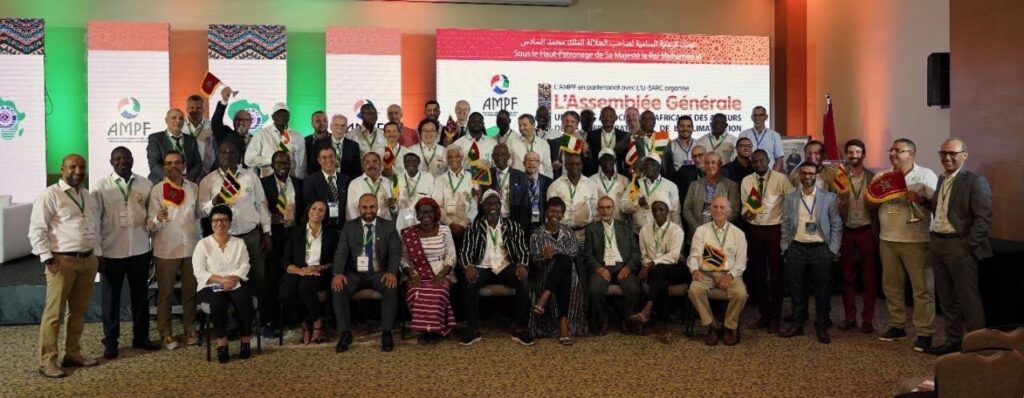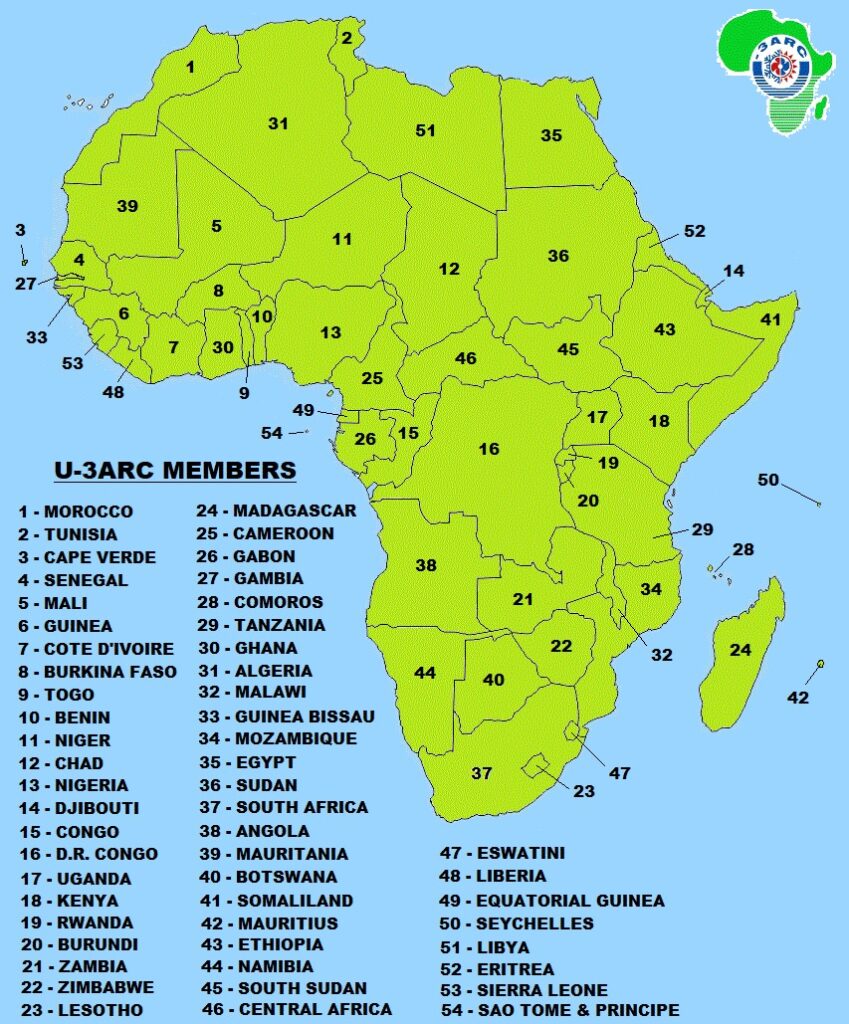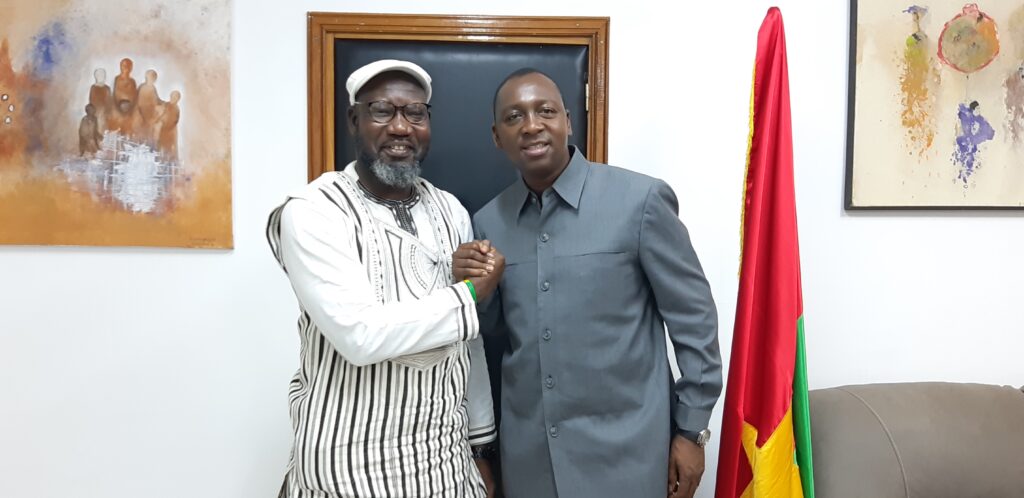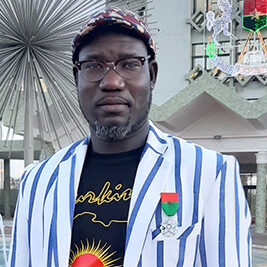Africa is a continent with great potential, including in terms of refrigeration. However, sub-Saharan Africa, similar to other areas with great development potential, faces serious difficulties. Here, 82% of workers depend on the agricultural sector, including both farming and fishing. It must also be considered that here over half of the sub-Saharan population – 600 million people – does not have access to electricity.
There is a need to grow, and the market potential is interesting. However, it is necessary to team up, create the conditions to share good practices and create “critical mass”.
It is precisely for this reason that the U-3ARC association (Union of Associations of African Actors in Refrigeration and air Conditioning) was born. Officially founded on September 24, 2020; it is made up of 30 national associations from 29 countries representing 18,000 companies employing 200,000 people (see figure n°1)

We began to lay the foundations for the birth of U-3ARC back in 2019. Personally, I decided to connect the various African national associations because I believe in the potential development of refrigeration and air conditioning in Africa to overcome lot of issues. Refrigeration, particularly, has crucial importance for the continent; where the great majority of the population lives in rural areas, where the main activities are agriculture, breeding, and fishing. All products coming from these areas of activity need the refrigeration sector to be sustainable. In this sense, it is possible to use clean energy such as photovoltaics to create solar refrigeration, powering the systems and cold rooms. I am aware that the refrigeration sector in Africa is facing various problems, especially in the sub-Saharan area, and even today it does not occupy the space it deserves. And therefore, it is necessary to work together to create the conditions to allow the potential growth of the refrigeration sector that it deserves.
The Union works precisely to bring the actors together. From the first meeting that took place in Burkina Faso, where the headquarters was established with a common agreement, the foundation of U-3ARC was carried out. From the initial 28 countries, today all 54 countries in Africa have joined (Figure n°2).

To achieve this important result, we worked to meet the other representatives of the various countries (out of the total of African countries, 38 have an association), to create the conditions suitable for participating in our association. In this sense, we are helping those in need to create the ideal conditions for an associative life, bringing the right ideas and stimuli, as well as inspirations from neighboring countries, to create virtuous examples.
In terms of training, U-3ARC has also launched ad hoc proposals, organizing specific webinars (Photo n°1). In addition, it has launched a survey / census to gather basic information on its members and on Africa – a useful initiative to understand the situation even better, open to all countries that have joined. U-3ARC has decided to organize an annual General Assembly in September, establishing that the host site will be, every two years, a country other than Burkina Faso, precisely intended to involve every country.

Some African countries have already developed RAC curricula for training centers and institutes.
The most significant example is Algeria. It has nearly 300 training centers in the refrigeration sector. Furthermore, Morocco and several others in North Africa have advanced or are making important progress: in particular, Tunisia has made enormous progress in terms of simplification and training, to ensure safe and quality refrigeration. I had the privilege of conducting certified training to trainers on the F-GAS topic and regulations through Centro Studi Galileo. This country is almost ready to count on a national certification law on alternative refrigerant gases (HFOs and HCs).
Another very important nation is South Africa, also at the regulatory level.
In Burkina Faso, thanks to the work done with U-3ARC, the Ministry of Energy has created an ad hoc department for refrigeration, the first ever in Africa. It was the minister himself, Dr. Ismael Bachir Ouédraogo who announced it, during U-3ARC General Assembly held in from September 24 to 26- 2021 in Ouagadougou (Burkina Faso), highlighting the importance of refrigeration (See Photo 2 & 3).


Photo 2 & 3: Meeting with the minister of Energy of Burkina Faso Dr. Ismael Bachir Ouédraogo
Africa has enormous untapped potential. First, it is not a saturated market, moreover, conditions are being created for technological development and more. There is a great demand for refrigeration and air conditioning and in terms of investments, there is only the embarrassment of choice.
But first of all, it is necessary to raise awareness of the importance of refrigeration, often hampered by high taxation. Only in sub-Saharan Africa does taxation rise from 40% to 65% depending on the country, as refrigeration equipment are considered luxury goods.
There is a great need of cold chain, especially in the agri-food sector. So, there are many conditions for investing in refrigeration in Africa, but there are many elements to grow. An example: there is no cheese factory in all of Burkina Faso, yet there is a lot of milk that can be processed and transformed into cheeses. The same for cured meat factories.
Refrigeration in Africa is the key to a sustainable development. Due to the lack of an appropriate cold chain in Africa, tons of food are wasted daily; therefore, refrigeration is crucial for African countries. As previously stated, around the 80% of the African population is living in rural areas, where the main activities are agriculture, fishery, and rearing; the production coming from these activities needs refrigeration to feed the population safely and sustainably – a proper cold chain is understandably fundamental in this sense. The development of the agrifood sector is not only a matter of providing fresh food to the population, but also of giving them the chance to grow strong and independent economically, creating employment and developing a welfare system, all the while being climate friendly.

Source UNIDO 2015
The future of the world depends on the future of the refrigeration. Within this context, U-3ARC and UNITED NATIONS INSTITUTIONS (UNEP, UNIDO, UNDP, …) can and should join forces on the African level to achieve these goals involving all African public bodies, such as the African Union by applying the following suggested actions, as efficient cold chain can drive to the achievement of 17 UNSDGs:
- Give pride of place to the HVAC-R sector by integrating its promotion in policy documents and development strategies (establishment of a favorable legal framework for the development of refrigeration, construction of refrigerated infrastructures at the zone of production and consumption, promotion of youth entrepreneurship, application of community guidelines on crafts, framework for the promotion of the cold chain etc.)
- Involve professional organizations and associations in the field of refrigeration and air conditioning in the development and implementation of policies and strategies and in activities related to refrigeration and air conditioning.
- Accompany and develop vocational training centers while ensuring their proper functioning, their equipment in appropriate teaching materials and facilitating accessibility (e.g. offer of scholarships).
- Engage in reflection on zero-rating and/or exemption of refrigeration equipment and equipment, which is not a luxury but a necessity for ensuring the socio-economic development of the country.
- Initiate the creation of an authority in charge of refrigeration which is attached to the Prime Minister’s office to take charge of the promotion of refrigeration with regard to its importance in sustainable development, its stake for food self-sufficiency and its transversal character (for example: energy, agriculture-breeding-fishery sector, environment, health, industry, trade,…).
- Establish a legal framework for better consideration of refrigeration in public development policies.
- Include the cold chain in priority sectors through the promotion of public-private partnerships in this area.
- Instruct the implementation of exemption measures on cooling and air conditioning equipment to promote their accessibility to the public and to producers in the agriculture, breeding, and fishery fields.
- Strengthen the dynamics of installing cold rooms in the different regions for the conservation of agricultural, breeding and fishery products.
- Promote women in the refrigeration and air conditioning professions.
- Adopt regulatory texts to consider energy efficiency in connection with refrigeration and air conditioning during the design, construction and operation phases of buildings and structures according to Kigali amendment on Montreal protocol.
- Adopt regulatory texts to control the import of certain types of refrigeration and air conditioning equipment using regulated refrigerants.
- Develop a public administration benchmark for projects to acquire refrigeration equipment and for maintenance operations of said equipment.
- Support activities promoted by national associations through U-3ARC in the refrigeration sector.
- AVOIDING DUMPING OF INEFFICIENT AND ENVIRONMENTAL HARMFUL EQUIPMENT IN AFRICA

Madi Sakandé
